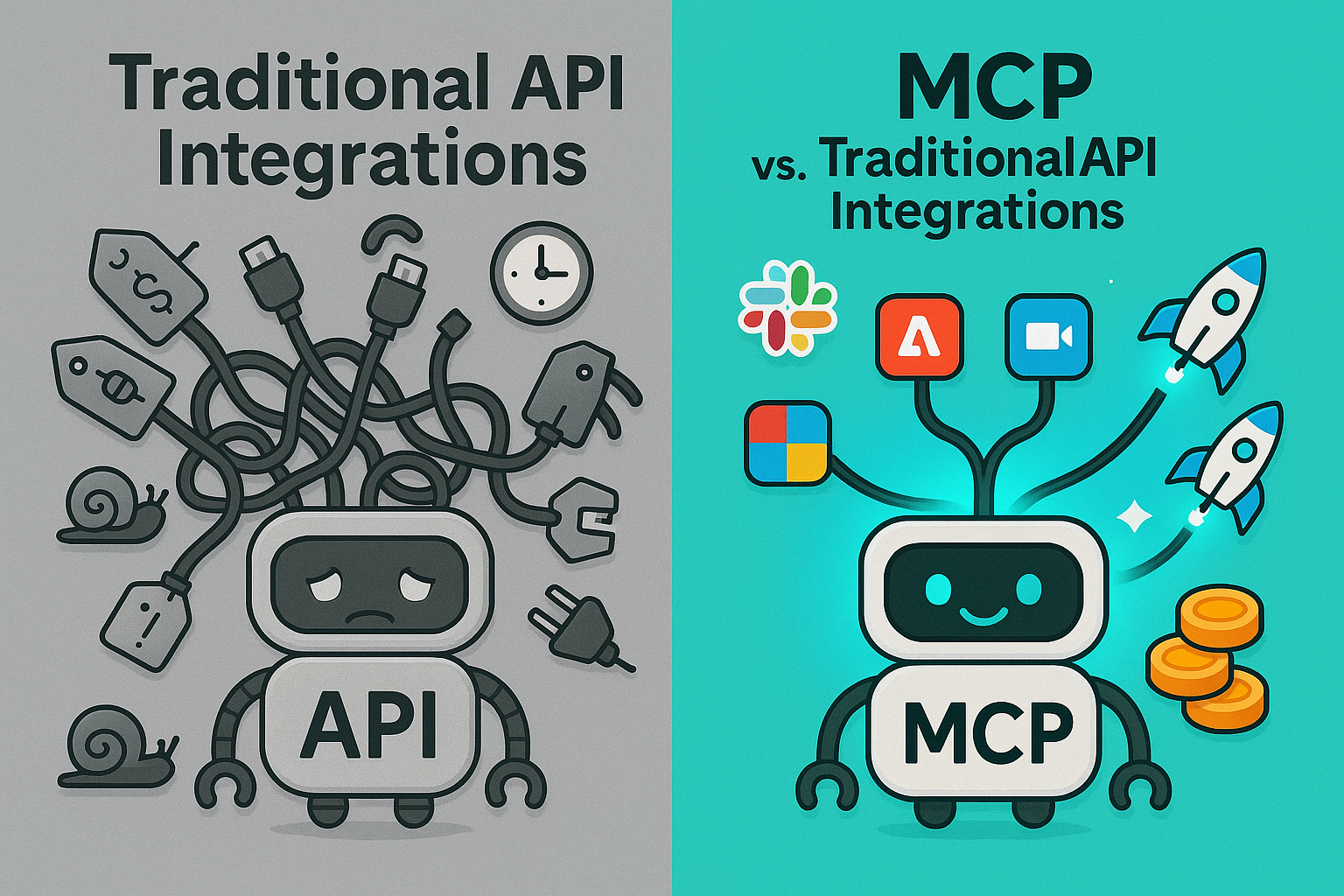MCP vs. Traditional API Integrations: Why Enterprises Are Making the Switch
Discover why enterprises are making the switch from traditional API integrations to the Model Context Protocol for AI-native workflows.

For decades, APIs have been the backbone of enterprise system integration. When organizations needed to connect applications, share data, or enable cross-system functionality, the solution was always the same: build custom API integrations. This approach worked well in a world of predictable, structured data exchanges between known systems.
But the rise of AI-driven workflows has exposed fundamental limitations in traditional API integration strategies. As enterprises increasingly rely on AI assistants to augment human decision-making, the rigid, point-to-point nature of traditional APIs creates bottlenecks that prevent AI from reaching its full potential.
Enter the Model Context Protocol (MCP)—a new integration paradigm designed specifically for AI-native workflows. While traditional APIs were built for system-to-system communication, MCP enables dynamic, context-aware interactions between AI models and enterprise resources.
The Traditional API Integration Challenge
Point-to-Point Complexity
Traditional API integrations create direct connections between specific systems for predetermined use cases. Each integration requires:
- Custom development for each system pair
- Specific data mapping and transformation logic
- Dedicated error handling and retry mechanisms
- Individual authentication and security protocols
- Separate monitoring and maintenance processes
For an organization with 20 business systems, traditional API approaches could require up to 190 individual integrations (20 × 19 ÷ 2) to achieve full connectivity. As systems multiply, integration complexity grows exponentially.
Static, Predetermined Workflows
Traditional APIs excel at structured, predictable data exchanges. A CRM system calls the billing API to create an invoice. The inventory system updates the e-commerce platform when stock levels change. These workflows are defined in advance and rarely deviate.
However, AI-driven workflows are inherently dynamic. An AI assistant helping with customer service might need to:
- Check customer history in the CRM
- Verify current order status in fulfillment systems
- Cross-reference product information in inventory databases
- Access support documentation in knowledge bases
- Create tickets in help desk systems
The specific combination of systems and data required depends on the unique context of each customer interaction—something traditional APIs aren't designed to handle efficiently.
Maintenance and Scalability Issues
Each traditional API integration is a custom implementation requiring ongoing maintenance. When systems update their APIs, undergo version changes, or modify data structures, every dependent integration needs individual updates. This creates significant technical debt and operational overhead.
As organizations add new systems or modify existing workflows, the web of point-to-point integrations becomes increasingly fragile and expensive to maintain.
The MCP Advantage: Integration for the AI Era
Universal Connectivity Model
MCP replaces the point-to-point integration model with a hub-and-spoke architecture. Instead of building custom integrations between every system pair, organizations deploy MCP servers that expose system capabilities in a standardized format.
Any MCP-compatible AI client can then access any MCP server, creating universal connectivity with minimal integration overhead. Adding a new system requires only one MCP server implementation, not dozens of custom API integrations.
Dynamic, Context-Driven Access
Unlike traditional APIs that provide fixed endpoints for predetermined workflows, MCP enables AI models to dynamically discover and utilize system capabilities based on conversational context.
An AI assistant can analyze a customer service request and automatically determine which systems to query, what data to retrieve, and which actions to take—all without pre-programmed workflows. This flexibility allows AI to adapt to unique situations and provide more intelligent, contextual responses.
Standardized Protocol Benefits
MCP's standardized approach provides several advantages over custom API integrations:
Consistent Security Model: All system access follows the same authentication and authorization patterns, simplifying security management and reducing attack surfaces.
Uniform Error Handling: Standardized error responses and retry mechanisms across all integrations reduce complexity and improve reliability.
Built-in Monitoring: Protocol-level observability provides comprehensive insights into AI system interactions without custom instrumentation.
Simplified Governance: Centralized access controls and audit capabilities across all connected systems through a single management plane.
Real-World Comparison: Customer Service Scenario
Integration Approach Comparison
Traditional API Approach
Required Integrations:
- • Custom CRM API integration
- • Order Management API connection
- • Inventory API integration
- • Knowledge Base API connection
- • Ticketing System API integration
Ongoing Maintenance: High
Flexibility: Low (predetermined workflows only)
Key Benefits
- Multiple custom integrations required
- Individual testing and deployment
- Separate error handling for each API
- High maintenance overhead
Key Advantages for Enterprise IT
Reduced Technical Debt
MCP's standardized approach significantly reduces the technical debt associated with custom integrations. System updates, security patches, and feature additions can be implemented once at the protocol level rather than across dozens of custom integrations.
Improved Agility
New AI use cases can be implemented rapidly by recombining existing MCP servers in novel ways. Business teams can deploy new AI-assisted workflows without requiring extensive development resources.
Enhanced Security Posture
Centralized security management through MCP proxy gateways provides better visibility and control than distributed API security implementations. Organizations can implement consistent security policies, monitor all AI-system interactions, and rapidly respond to security incidents.
Simplified Vendor Management
MCP's open standard reduces vendor lock-in compared to proprietary API integration platforms. Organizations can choose best-of-breed solutions for different components while maintaining interoperability.
Migration Considerations
Gradual Adoption Strategy
Organizations don't need to abandon existing API integrations immediately. MCP can be introduced alongside traditional APIs, allowing for gradual migration based on business priorities and technical feasibility.
Start with high-value AI use cases that require dynamic system access, then expand MCP adoption as the benefits become apparent.
Investment Protection
Existing API investments remain valuable. Many MCP servers can be built as lightweight wrappers around existing APIs, preserving previous development work while adding MCP capabilities.
Skills and Training
While MCP represents a new paradigm, it builds on familiar concepts. Development teams with API experience can quickly adapt to MCP server development, and the standardized approach often reduces the learning curve compared to managing multiple custom APIs.
The Future of Enterprise Integration
The shift from traditional API integrations to MCP represents more than a technical upgrade—it's a strategic evolution toward AI-native enterprise architecture. Organizations that embrace this transition will be better positioned to leverage AI's full potential while reducing integration complexity and technical debt.
As AI becomes increasingly central to business operations, the integration strategies that worked for traditional applications will become limitations. MCP provides the foundation for the next generation of intelligent, connected enterprise systems.
Making the Strategic Decision
For enterprise IT leaders evaluating integration strategies, the choice between traditional APIs and MCP isn't just about technical implementation—it's about positioning your organization for an AI-driven future.
Traditional APIs will continue to serve important roles in system-to-system communication, but MCP represents the integration paradigm that unlocks AI's transformative potential. Organizations that recognize this distinction and act accordingly will gain significant competitive advantages in the rapidly evolving digital landscape.
